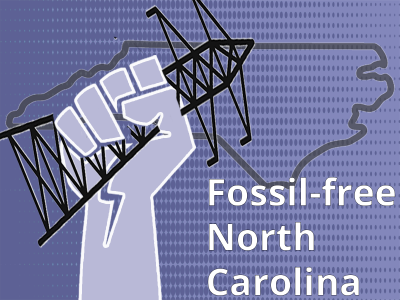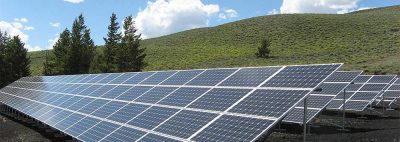Front Porch Blog

North Carolinians feel the effects of climate change daily. Because of that, we’re embarking on a plan to reduce carbon pollution and modernize electricity generation across the state. Gov. Cooper capped off several years of collective work on North Carolina’s Clean Energy Plan when he signed HB 951 into law in October 2021. The law requires the North Carolina Utilities Commission and Duke Energy to develop a plan to reduce carbon emissions by 70% by 2030.
While Appalachian Voices opposed that bill, that 70% carbon reduction plan was a concession Duke made in negotiating with Gov. Cooper that could move our state in the right direction.
Unfortunately, state regulators are allowing Duke Energy to lead the planning process, as usual. It’s a multi-stage process involving stakeholder input sessions. Appalachian Voices has been involved in this process since the beginning, as a stakeholder in many of the governor’s initiatives.
Because of the work we’ve been doing and the conversations we’ve had, we now have the opportunity to help create a plan that not only helps us reduce emissions but makes sure utility bills are affordable and keeps the lights on.

Duke Energy’s carbon reduction plan doesn’t rely very much on proven renewable technologies like solar power.
The information Duke Energy has presented so far points toward a path to emissions reduction that isn’t in line with the interests of all North Carolinians. Duke says it can reach significant emissions reductions by building polluting natural gas plants across state lines, rather than developing clean energy resources within our state borders.
Duke’s plan also relies on nuclear technology that hasn’t been successfully deployed yet, when proven technologies like solar, battery storage and offshore wind have become increasingly affordable.
Because HB 951 lets Duke own new resources instead of prioritizing a competitive wholesale market, this transition is going to be expensive, and those costs will be passed on to ratepayers. Instead of proposing programs and policies to help people pay their power bills and avoid utility shut offs, Duke Energy says it will monitor the situation. There are plenty of program and repayment options Duke could be using to make bills more affordable and avoid having to shut off people’s power. Unfortunately, to date, Duke has only provided such support to a limited number of low-income customers.
Appalachian Voices has its eyes on Duke Energy and the Carbon Reduction Plan. Duke Energy has consistently stonewalled advocate’s requests for access to information. The process has lacked the principles previously highlighted, and we’re fearful the results might too.
That’s why we’re stepping up and taking legal action by intervening, which allows us to argue our case in front of the utilities commission. It’s a legal process featuring technical experts and witness testimony that allows for questions and cross-examination from other parties and the commission.
We’re committed to fighting for a just transition that provides affordable renewable energy to all North Carolinians — because if we want to continue to see renewable energy rolled out in a way that benefits all of us, we’re going to have to fight for it.
We’ll be here for you along the way, breaking down the information and letting you know when you need to take action. Get involved by following us on social media or signing up for our email list so you can stay up to date on NC’s Carbon Plan.
Below is a 2022 timeline for the Carbon Reduction Plan process, letting you know when you can anticipate updates, and how you can participate down the road.
- January-May: Stakeholder Input
- May 16 – Deadline for Duke to File Carbon Plan
- Public Hearings
- July 11, Durham
- July 12, Wilmington
- July 27, Asheville
- July 28, Charlotte
- August 23, Virtual Hearing
- Dec. 31: Carbon Plan Finalized
We’re excited to be working with partners from across the state on a plan that works for all of us. Join us March 30 for a conversation about what a people focused carbon reduction plan can look like!
PREVIOUS
NEXT

Leave a comment
Your email address will not be published. Required fields are marked *

Leave a Comment